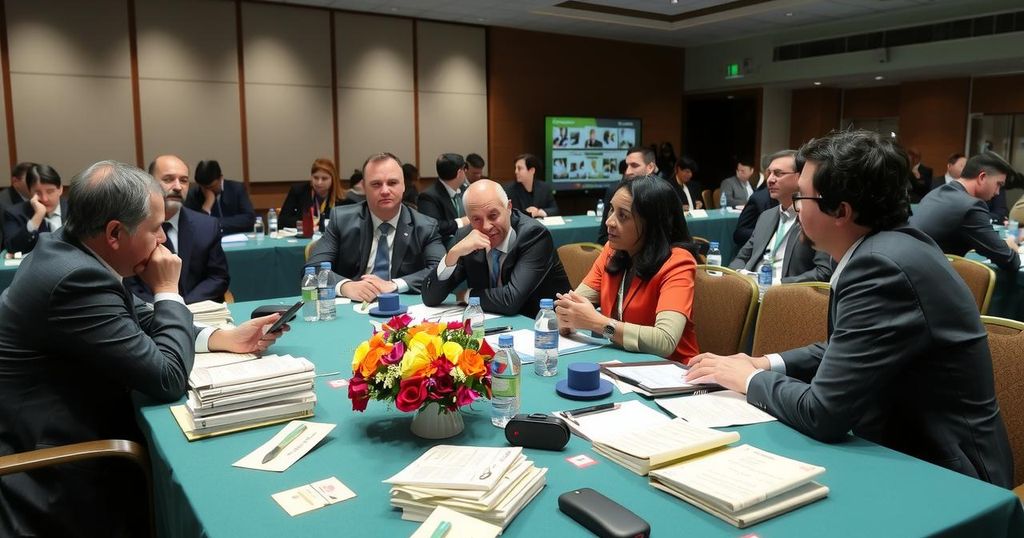COP29 brought together 60,000 leaders and experts in Baku, Azerbaijan, to discuss climate action. The importance of storytelling and radical collaboration was emphasized, focusing on issues like climate finance and migration. The experience highlighted the need for multidisciplinary approaches to inspire collective action against climate change through engaging narratives.
My recent journey from New York City to Baku, Azerbaijan, where the United Nations Climate Change Conference (COP29) convened, encompassed over seven thousand miles. Baku, characterized by its colorful, flame-shaped towers, stands as an oil-rich nation with borders that include Iran and Russia. Over the course of the conference, more than 60,000 leaders, experts, and civil society members engaged in discussions, with high-level negotiations among delegates from nearly 200 countries taking place in secure environments.
As a member of the steering committee for the UNFCCC Entertainment & Culture for Climate Action Film & TV (ECCA), I focused on critical topics such as finance, human migration, and the cultural dimension of climate solutions. This aligns with my Climate School course titled, “Climatic Change: Storytelling Arts, Zeitgeist and Our Future,” where I guide interdisciplinary students through complex geopolitical themes while fostering innovative storytelling practices that address climate challenges across diverse media.
Narratives have the transformative power to reshape behaviors, values, and belief systems in the face of climate change. Engaging storytelling draws from compelling characters and relatable themes, which resonate deeply with audiences and inspire civic engagement. My students are acutely aware of the impacts of climate change on their home countries, from rising sea levels in Mexico and Malaysia to the catastrophic flooding in Pakistan. These personal experiences drive their commitment to addressing climate narratives in their creative work.
The 2015 Paris Agreement emphasizes the importance of education and public engagement in climate action. Our class investigates how storytelling can influence public perception regarding consumption and extraction. I frequently heard references at COP29 to the film, “Everything, Everywhere, All at Once,” which reflects on humanity’s struggles within fossilized systems. This discussion sets the stage for understanding the multifaceted nature of climate change.
At the “Knowledge Day” event in Baku, forced displacement and climate mobility were pivotal subjects. Lisa Dale, director of the M.A. in Climate and Society program, facilitated a panel addressing the dignified relocation in light of climate change. Our studies, including Dale’s book, focus on how various stakeholders can access and utilize climate data effectively.
As we evaluate the media’s role in climate conversation, particularly in Hollywood, we observe a troubling trend of “climate silence.” Despite initiatives to include climate mentions in films and television shows, this effort appears insufficient compared to the anti-climate narratives propagated by fossil fuel interests. During COP29, I articulated the necessity of climate storytelling and the concept of “radical collaboration,” reflecting the collective engagement we practice in our classroom in New York.
Throughout the conference, dialogue featured prominent voices advocating for action on behalf of vulnerable nations facing the dire consequences of climate change. However, negotiations on global climate finance proved challenging, with delegates setting an annual goal of $300 billion by 2035—an amount that remains inadequate for nations threatening survival from climate threats.
The encounters I had with experts like Bridget Kakuwa and Teddy Mugabo highlighted examples of grassroots action amidst adversity. Instructing my students, I encourage them to synthesize their learning into projects that unify climate science with storytelling. This creative process aims to ignite crucial discussions about our collective future.
As I reflect on my experiences at COP29, it has become increasingly clear that a collaborative, multidisciplinary approach is not merely innovative but essential. Investing in narrative frameworks can cultivate humanistic values that nurture care for one another as we work toward viable solutions against climate change. It is imperative for individuals across various sectors to unite as artists, scientists, policymakers, and citizens in order to foster healthier and more sustainable futures for all humanity.
The 29th Conference of the Parties (COP29) of the UN Climate Change framework convened in Baku, Azerbaijan, where leaders, experts, and civil society engaged in extensive discussions about climate action. With over 60,000 participants, the conference addressed critical themes including finance, climate migration, and the influential role of storytelling in fostering climate solutions. The importance of narratives in shaping public perception and engagement on climate issues has garnered attention, especially in light of the rising urgency of climate impacts worldwide.
In conclusion, the experiences and dialogues presented at COP29 reinforce the critical need for a multidisciplinary and collaborative approach towards addressing climate challenges. The power of storytelling in influencing public perception and inspiring action cannot be overstated. By harnessing the collective strengths of artists, scientists, and policymakers, society can develop more effective narratives that empower individuals and communities to confront climate change and strive for a sustainable future.
Original Source: news.climate.columbia.edu






